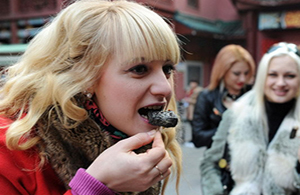Mo Yan fever
(China Daily) Updated: 2012-11-01 07:58It is sad to see that the Nobel Prize for literature for Mo Yan has prompted many in China to cash in on the author's new-found international fame, says an article on voc.com.cn. Excerpts:
The latest in the cashing-in-on-Mo-Yan-fame story is of an engineer, surnamed Hou. Hou, a Beijing resident spent 1,000 yuan ($160.3) six years ago to register a wine brand called "Moyanzui". But he sold the brand for about 10 million yuan after Mo Yan won this year's Nobel Prize for literature because the brand carries his name.
Though Hou had not even dreamt of making that sort of money when he registered the brand, the sudden global fame of Mo Yan has made him a multimillionaire overnight.
The Mo Yan fever somehow reflects a twisted social mentality and the power of commercial speculation. Everything related or associated with the author or his name has become a source of big money.
A 10-year-old Mo manuscript can now fetch up to 1.2 million yuan and a novel with his signature can get up to 100,000 yuan. Some restaurants are even selling roast chicken at special prices claiming the recipe to be from the author's hometown. No wonder, many people are complaining that Mo Yan's "hallucinatory realism" has been ruined by consumption realism let loose by many hungry-for-profit Chinese.
A mature society should have reacted placidly to Mo Yan winning the Nobel Prize. But the media's endless coverage of the author and the public fever it has generated have given birth to an absurd world (of commerce) that Mo Yan has created in many of his works.
Though Chinese society had long been anticipating a Nobel Prize for one of its authors, the prize for Mo Yan shows that many were not prepared for it.

I’ve lived in China for quite a considerable time including my graduate school years, travelled and worked in a few cities and still choose my destination taking into consideration the density of smog or PM2.5 particulate matter in the region.











